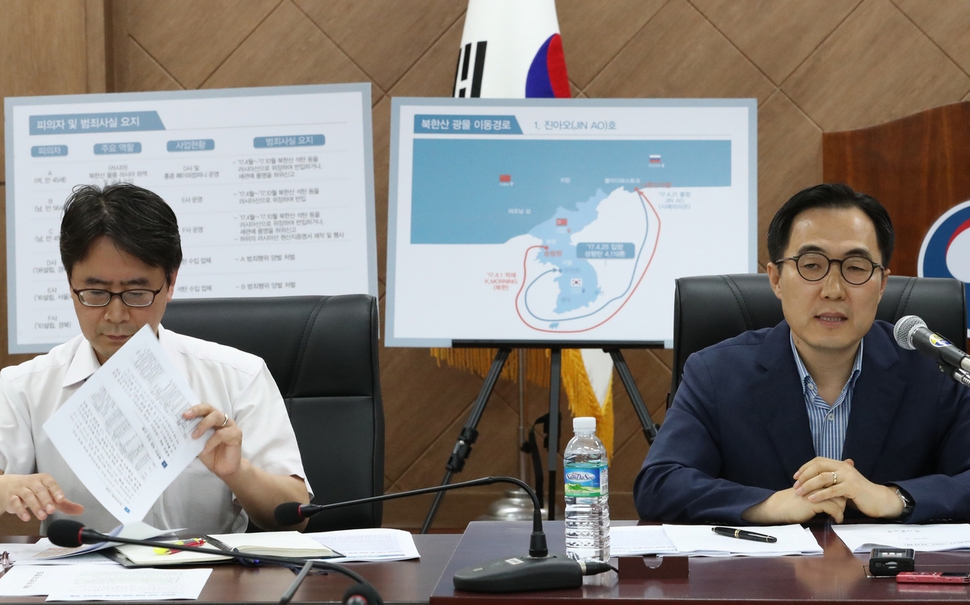 |
|
Kim Jae-il (right), Chief of the Korea Custom Office’s Investigation and Surveillance Bureau, and Kim Hyun-suk, head of the investigation planning division, discuss how South Korean companies illegally imported North Korean coal at the Daejeon Government Complex on Aug. 10. (Yonhap News)
|
Ploy was to avoid bank transactions
The importing business that orchestrated the importation of North Korean coal received its brokering fees in kind with coal to avoid cash transactions in a bank, a Korea Customs Service (KCS) investigation has confirmed. “Company ‘H’ [which delivered the coal to Korea South-East Power while concealing its North Korean origin] received North Korean coal rather than cash as a transaction fee for its brokering efforts,” the KCS said in an investigation announcement on Aug. 10. “It did not go through cash transactions at a bank, and its movements were not connected to cash flows,” the KCS explained. The account indicates that the case was one of intermediary trade, with another company standing in for the exporter (North Korea) and importer (third country) in exchange for brokering fees, rather than transit trade in which the two parties seek sales profits as direct parties to a contract. The description is also at odds with speculation that the company purchased cheap North Korean coal to make a profit by disguising it as Russian and selling it at a higher price in South Korea. The import price reported to customs authorities by company H was US$96 per ton, the same amount submitted with its winning quote in previous international competitive bidding for Korea South-East Power (KOEN). The value is actively higher than the US$92 average important price for actual Russian coal in Oct. 2017. A total of five companies entered KOEN’s competitive bidding for imported anthracite deliveries, all of them indicating Russia as the place of origin. While the other four bidders quoted prices of US$123–142 per ton, company H quoted a low price of US$96 per ton for 40,000 tons. “In terms of the bidding eligibility criteria at the time, there have been accusations that the past delivery performance terms were too strict, so the past performance was adjusted to ‘minimum,’” KOEN explained. “That is my understanding on how H was able to take part in the bidding despite its small scale. But we also stipulated in the bidding announcement that we would not accept either North Korean or Chinese product,” it added. The importation contract between KOEN and H was abruptly dissolved after two transactions (9,700 tons total) in Oct. 2017, which were belatedly confirmed to have consisted of North Korean coal. “After H failed to meet the designated delivery date for the next volumes after the October imports, we immediately ended the contract for the remaining November volumes and used a different source for importation,” KOEN said. While South Korean thermoelectric power plants generally use bituminous coal, two older power plants around the forming coal-mining region of Samcheok – KOEN’s Yeongdong power plant and Korea East-West Power’s Donghae power plant – use anthracite, which has been imported in the past from Russia and North Korea. By Cho Kye-wan, staff reporter Please direct comments or questions to [english@hani.co.kr]






